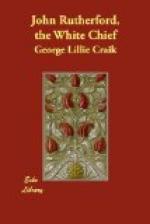So, when any land is purchased, it is secured to the purchaser by being “tabooed.”
Marsden states that upon one occasion he found a great number of canoes employed in fishing, and all the fish which they took were immediately “tabooed,” and could not be purchased. These fish were probably intended to be cured and preserved as part of the common stock of the tribe.
The principal inconveniences sustained by the person who is “tabooed” seem to be that he must have no communication with any who are not in the same condition as himself, and that in eating he must not help himself to his food with his hands. The chiefs are in such a case fed by their attendant; but the absurd prohibition is a serious punishment to the common people, who have nobody to assist them.
Nicholas relates an amusing incident illustrative of this. “On going into the town,” says he, “in the course of the day, I beheld several of the natives sitting round some baskets of dressed potatoes; and being invited to join them in their meal, I mingled with the group, when I observed one man stoop down with his mouth for each morsel, and scrupulously careful in avoiding all contact between his hands and the food he was eating. From this I knew at once that he was ‘tabooed;’ and upon asking the reason of his being so, as he appeared in good health, and not afflicted with any complaint that could set him without the pale of ordinary intercourse, I found that it was because he was then building a house, and that he could not be released from the ‘taboo’ till he had it finished. Being only a “cookee,"[AA] he had no person to wait upon him, but was obliged to submit to the distressing operation of feeding himself in the manner proscribed by the superstitious ordinance; and he was told by the tohunga, or priest, that if he presumed to put one finger to his mouth before he had completed the work he was about, the atua (divinity) would certainly punish his impious contempt, by getting into his stomach before his time, and eating him out of the world. Of this premature destiny he seemed so apprehensive that he kept his hands as though they were never made for touching any article of diet; nor did he suffer them by even a single motion to show the least sympathy for his mouth, while that organ was obliged to use double exertions, and act for those members which superstition had paralysed.
“Sitting down by the side of this deluded being, whom credulity and ignorance had rendered hopeless,” says Nicholas, “I undertook to feed him; and his appetite being quite voracious, I could hardly supply it as fast as he devoured. Without ever consulting his digestive powers, of which we cannot suppose he had any idea, he spared himself the trouble of mastication; and, to lose no time, swallowed down every lump as I put it into his mouth: and I speak within compass when I assert that he consumed more food than would have served any two ploughmen in England.




